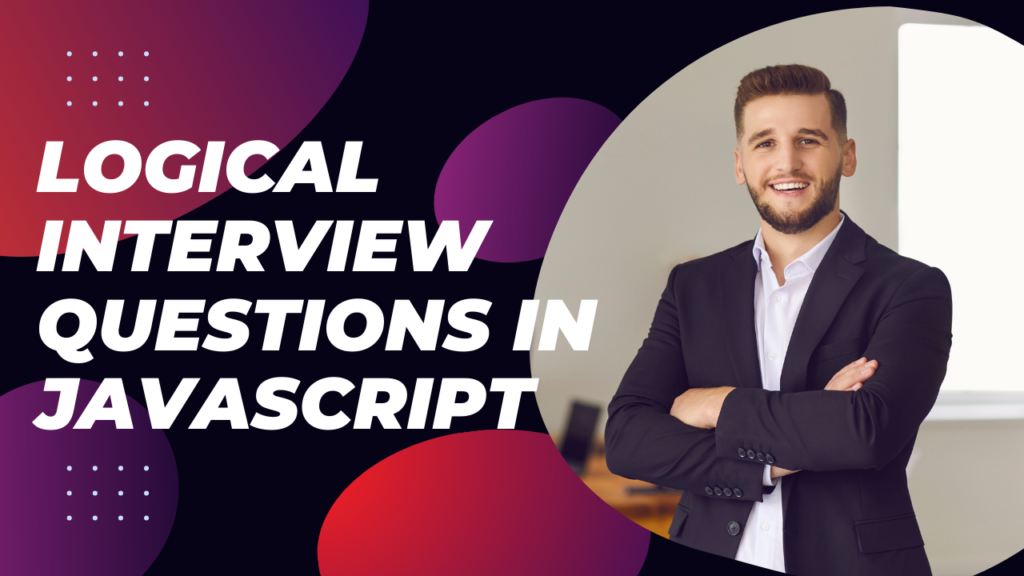Welcome to our new blog Logical Interview Questions In JavaScript.
Introduction:
JavaScript is a versatile language with many nuances, and mastering its concepts is crucial for acing technical interviews. In this blog post, we’ll unravel the answers to some logical interview questions, providing clarity on topics like equality operators, the nullish coalescing operator, spread operators, loops, the `this` keyword, and more.
Logical Interview Questions In JavaScript

1. Difference between `==` and `===`
(loose equality) performs type coercion, allowing different types to be considered equal.
(strict equality) checks both value and type, requiring an exact match.
2. Nullish Coalescing Operator (`??`)
The nullish coalescing operator returns the right-hand operand when the left-hand operand is `null` or `undefined`, but not for falsy values like `0` or an empty string.
3. Spread Operator
The spread operator (`…`) is used to unpack elements from an iterable (e.g., an array) into a new array, function arguments, or object properties.
4. Loops in JavaScript
JavaScript supports various loops, including `for`, `while`, and `do-while`.
The `for…of` loop is ideal for iterating over iterable objects like arrays.
The `for…in` loop is used for iterating over object properties.
5. The “this” Keyword
`this` refers to the current execution context in JavaScript.
Its value is determined by how a function is invoked: in a regular function, it refers to the global object, but in a method, it refers to the object the method is called on.
6. Call, Apply, and Bind
`call` and `apply` invoke a function with a specific `this` context. The difference lies in how arguments are passed: `call` passes individual arguments, while `apply` accepts an array of arguments.
`bind` returns a new function with a fixed `this` context, useful for later invocation.
7. Anonymous Functions
Anonymous functions are functions without a name.
They are often used as function expressions or as arguments to higher-order functions.
8. Hoisting in JavaScript
Hoisting is a JavaScript behavior where variable and function declarations are moved to the top of their containing scope during the compilation phase.
Variables declared with `var` are hoisted and initialized with `undefined`.
9. Callback Functions
A callback function is a function passed as an argument to another function.
It allows for asynchronous operations, event handling, and more.
10. Promises in JavaScript
Promises represent the eventual completion or failure of an asynchronous operation.
They have three states: pending, resolved (fulfilled), or rejected.
11. Promise Chaining
Promise chaining is a technique where multiple promises are chained together using `then` to handle asynchronous operations sequentially.
12. Promise.all()
`Promise.all()` is a method that takes an array of promises and returns a new promise that resolves when all the promises in the array have resolved, or rejects if any of them reject.
13. Async/Await in JavaScript
`async/await` is a syntax for handling asynchronous code.
`async` declares an asynchronous function, and `await` is used inside that function to wait for the resolution of a promise.
Understanding these JavaScript concepts is essential for navigating technical interviews with confidence. Whether you’re a seasoned developer or a newcomer, mastering these topics will undoubtedly strengthen your JavaScript proficiency. Happy coding!
Reference:
JavaScript Documentation
Read More Blog:
JavaScript Interview Questions And Answers
Conclusion:
Mastering logical interview questions in JavaScript is crucial for anyone looking to excel in the tech industry. These questions test not only your technical knowledge but also your problem-solving skills, creativity, and ability to think algorithmically. By practicing a wide range of logical problems, you can improve your coding efficiency, enhance your debugging skills, and gain a deeper understanding of JavaScript fundamentals.
Whether you’re a beginner preparing for your first job interview or an experienced developer aiming for a more advanced position, tackling these logical challenges will give you a competitive edge. Remember, the key to success is consistent practice and a thorough understanding of the underlying concepts. Embrace each challenge as an opportunity to learn and grow, and soon you’ll find yourself more confident and capable in handling complex coding problems.
Good luck with your interview preparation, and happy coding!

My brother recommended I might like this web site He was totally right This post actually made my day You cannt imagine just how much time I had spent for this information Thanks
Thank you for taking the time to share your thoughts and for being a part of our community. We look forward to serving you even better in the future.
Wow wonderful blog layout How long have you been blogging for you make blogging look easy The overall look of your site is great as well as the content
Thank you for taking the time to share your thoughts and for being a part of our community. We look forward to serving you even better in the future.